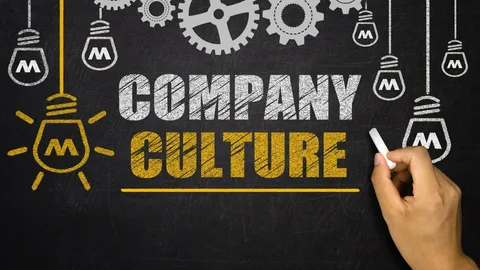The Role of Leadership in Building a Strong Company Culture
Learn more: Leadership in Building Company Culture.
The role of leadership in building a strong company culture is important to any company. While there is no one magic formula to creating a great workplace, there are some basic characteristics of effective leaders. In this article we’ll explore what they are and why they are so important.
Table of contents
What is Company Culture and Why is it Important?
Building a company culture is a concept that involves a shared set of beliefs, values, and goals like role of leadership. It can also refer to the physical workplace, the management style, or the benefits offered to employees.
A positive company culture will lead to employee engagement, productivity, and retention. In addition, it can improve your reputation.

While there is no one-size-fits-all definition of company culture, there are some common attributes. For example, a company’s culture can be shaped by its culture-conscious leaders, the type of work environment it offers, and the type of company policies it has in place.
For example, in order to create a good company culture, employers should make rules and regulations clear to their staff. They should also lead by example, and reward employees for doing the right thing.
A good company culture can help your business stay a step ahead of the competition. This can include keeping your customers happy, building a reputation for being a great place to work, and attracting and retaining the best talent.
The best part about creating a positive company culture is that it will encourage your employees to do their best work. Studies have shown that the happier a worker is, the more productive they will be. Employees are also more likely to feel like they have a place in the organization.
The Characteristics of Effective Leadership
Effective leadership can be a critical factor in helping companies improve productivity and efficiency. It also helps employees build trust in an organization.
Good leaders have a strong desire to grow and develop themselves, as well as others. The best leaders are always learning, always willing to try new things, and always committed to the future of the organization.
A leader’s effectiveness is often measured by his or her ability to communicate effectively, engage team members, and achieve strategic goals. In addition to achieving these goals, good leaders also help employees learn and grow.

Leaders are expected to be a role model for their teams and share their vision with all of their team members. They are expected to set examples by doing what they say they will do and by holding themselves accountable.
Great leaders are also willing to admit when they have made a mistake or misjudged a situation. They aren’t afraid to take responsibility for their actions and show genuine emotion to their teams.
Moreover, good leaders know how to create a healthy work environment and aren’t afraid to address issues. Leaders who are able to lead their team through change and make strategic decisions quickly and without wavering are the most effective.
Effective leadership is essential to the success of any company. A company’s culture can either empower or de-energize the workforce. Choosing the right leaders and developing them can help your company become a high-performing organization.
Summary of Characteristics of Effective Leadership
| Characteristic | Description |
| Clear Communication | Excellent verbal and written communication skills, active listening, and clarifying questions. |
| Decisiveness | Ability to make quick and informed decisions in challenging situations. |
| Empathy | Understanding the feelings and emotions of team members and creating a supportive and inclusive work environment. |
| Accountability | Holding themselves and others accountable for actions, setting clear expectations, and taking responsibility for mistakes. |
| Adaptability | Adjusting to changes in the business environment and encouraging team members to be flexible. |
| Vision | Having a clear vision of where they want to take their team or organization and setting challenging but achievable goals. |
| Confidence | Inspiring confidence in others by setting a positive example and recognizing and rewarding team members’ accomplishments. |
Clear Communication
Great communicators make for effective leaders. They can communicate their ideas simply and succinctly both orally and in writing because to their great communication abilities. In order to make sure they comprehend the message being communicated, they also actively listen to others and ask clarifying questions.
Decisiveness
Strong leaders take charge. Even in difficult situations, they are able to act fast when necessary. Before making a choice, they acquire information and consider the advantages and disadvantages of each alternative.
Empathy
Empathetic leaders are successful. They can relate to their team members on a personal level and are aware of their thoughts, feelings, and emotions. They establish a welcoming and inclusive workplace where everyone is treated with respect and worth.
Accountability
Successful leaders are accountable for their own behavior as well as that of their team. They make pledges and establish clear expectations. Also, they accept responsibility for errors and seek to make them right.
Youtube Video About ” Leadership in Building Company Culture “
Adaptability
Adaptable leaders are successful. They are able to quickly modify their plans in response to changes in the business environment. They also promote flexibility and adaptability in their team members’ job duties.
Vision
A clear vision of where they wish to take their group or organization is possessed by effective leaders. By establishing ambitious but doable goals and giving the tools and support needed to reach them, they inspire and motivate people to strive toward this vision.
Confidence
Successful team members and leaders have faith in their own and one another’s talents. By leading by example and praising and rewarding their team members’ successes, they encourage confidence in others.
Ways to Foster a Positive Company Culture
In a positive work culture, employees enjoy less stress and more productivity. And they do it in a way that encourages teamwork, collaboration, and social interactions. That’s a win-win for everyone involved.
The best way to foster a positive company culture is to start from the top down. Leaders should set the tone, and then make sure their people have what they need to succeed.
A good first step is to create a fun and safe workplace. It’s not just about a cool office – it’s also about protection of employee rights. This includes providing on-site healthcare options.

Employees are also more apt to engage in positive behavior when they see their employers doing it. To encourage this, have a monthly town hall meeting for employees to discuss company announcements and new business outcomes.
A strong company culture is also a big plus for recruiting, because a positive culture is more likely to attract talent that wants to make the workplace their home.
So make sure to make your workplace as attractive to prospective employees as it is to current employees.
Another tidbit is the fact that employee productivity increases by nearly 30% when a positive work culture is in place. Moreover, job satisfaction increases by 50%.
Investing in a positive company culture is a smart move that could help your organization stay ahead of the competition.
Final Thought
In conclusion, developing a positive workplace culture is essential to having a successful business. A healthy work environment can be created and is maintained in large part by effective leadership.
Creating a culture that fosters open communication, development, accountability, and a sense of community should be a priority for leaders.
Leaders may enable their staff to accomplish their best work and contribute to the success of the firm by setting an example and giving the necessary tools.
In the end, investing in a positive corporate culture is advantageous for the firm as well as for the happiness and well-being of its staff.
You May Also Like
Tips for Improving Your Time Management Skills. Please click for read.
Mastering Remote Work – Understanding the Different Models and Strategies. Please click for read.
You can click here to follow the latest current developments in the business world.
FAQ
Leadership is the ability to motivate, influence, and lead others. It requires creating a vision, expressing it, and inspiring others to achieve it.
Leaders need communication skills, empathy, adaptability, vision, integrity, and the capacity to inspire and motivate others. Good leaders also seek feedback and promote personal growth.
An effective leader inspires and motivates their team to achieve their goals while adapting to changing circumstances and challenges. Leaders with a clear vision can inspire their team. They also value team building and trust.
Leadership inspires and guides people and organizations. Effective leadership motivates people and creates a productive workplace. Leaders may help organizations adapt and overcome obstacles.
A true leader inspires and guides a group toward a goal. Authentic, modest leaders put their team first. They can adjust and communicate well.





